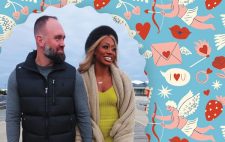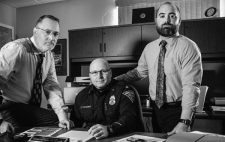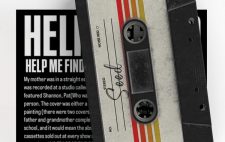Anne Hathaway was going on auditions before she was old enough for a driver’s license. “Whenever my mother wasn’t free to drive me into Manhattan for auditions, I would take the train from suburban New Jersey,” she says. Hathaway’s father, an attorney who worked in the city, would meet her at Penn Station.
“We would then get onto the subway together and, when we surfaced, he would ask me, ‘Which way is north?’ I wasn’t very good at finding north at the beginning,” she described during a keynote speech at a United Nations event for International Women’s Day, “but I auditioned a fair amount and so my dad kept asking, ‘Which way is north?’ Over time, I got better at finding it.”
The anecdote is an apt metaphor for a career that’s spanned more than 2 decades. The early years saw a young Hathaway moving in many directions as she worked out her trajectory as an artist. Now, at 41, the mother of 2 is a force: an Oscar, Emmy and Screen Actors Guild Award winner with countless acting and production credits and, still, one of the most recognizable faces in the industry. In transitioning from ingenue to icon – without losing herself in the process – Hathaway’s more than a direction-setter in Hollywood. She’s become its true north.
*****

Hathaway’s dreams of stardom started early. Growing up in North Jersey, she watched her actress mom, Kate McCauley Hathaway, play the role of Fantine in the first touring company of Les Misérables. (If that seems like foreshadowing for Hathaway’s Oscar-winning turn in the film version, well, it is.) Though she begged to start acting professionally then, Hathaway’s parents held her off. “My husband and I had seen perfectly nice children become little monsters with all that attention,” McCauley Hathaway once told the New York Post. “We said, ‘Absolutely no, darling. Your job right now is to be a child.’”
But that time also marked the start of another kind of education that would shape Hathaway’s future. McCauley Hathaway left the acting industry soon after that role. “My mother had to choose between a career and raising 3 children – a choice that left her unpaid and underappreciated as a homemaker,” Hathaway told the UN, “because there just wasn’t support for both paths.” Later, it would influence her to work toward progress and equality for women as a UN Women Goodwill Ambassador.
“I was raised to consider my own privilege,” she told one reporter. “We were not a wealthy family, but we had more than a lot of people. My parents made sure we were aware – we worked in soup kitchens and talked about women’s issues. I was a child of the ’90s. It had a huge impact on me to be raised to believe that my gender was neither a benefit nor an obstacle. I want every single girl to have the experience that
I had growing up. Freedom, support, doors open. It had never occurred to me that I couldn’t get through every door I was working hard to go through.”
And eventually, after many school productions and shows at the local Paper Mill Playhouse, a teenaged Hathaway was allowed to start auditioning for professional roles, though her parents kept an eye on things. “I remember saying to Annie, ‘You’re entering a world where all you’re going to hear is yes. We’re the ones who are going to say no when you need to hear it,’” McCauley Hathaway says. “And I think that really helped keep her grounded.”
But Hathaway’s star rose rapidly. She starred in “Once Upon a Mattress” at Millburn High School, and just 3 years later was well on her way to household name status with the premiere of “The Princess Diaries.”
A veritable hit parade followed, and Hathaway became known for a chameleon-like ability to shift between roles and genres. She avoided the trap of type-casting, gaining as much critical acclaim for playing a fashion magazine assistant in “The Devil Wears Prada” as for portraying a drug-abusing problem child in “Rachel Getting Married.” She appeared in one blockbuster after another: Brokeback Mountain, The Dark Knight Rises and Les Misérables, to name just a few.
She became a favorite of audiences and directors, not least because of a total commitment to each role. She told Interview Magazine she aspired to be like Vivien Leigh, a classic Hollywood actress she once heard described as willing to “crawl over broken glass if she thought it would help her performance. That’s how I see myself as an actress,” Hathaway says. “I may not be the best in the world, but I love my craft more than just about anything, and I will give everything I have to it, whatever the cost… I feel like such a jerk when I say ‘my craft,’ but I do feel that way.”
But Hathaway’s earnest nature (she famously insists people who know her in real life call her Annie) has also made her the butt of jokes. In the early 2010s, on the heels of earning an Oscar for playing Fantine, she faced a firestorm of online vitriol – a phenomenon dubbed “Hathahate” – for no real reason at all. She was mocked for being too bubbly, coming off too rehearsed, being too genuine, or too “perfect.”
“A lot of people wouldn’t give me roles because they were so concerned about how toxic my identity had become online,” Hathaway said recently. But Christopher Nolan, who’d worked with Hathaway on “The Dark Knight Rises,” disregarded the inexplicable campaign of hate and cast her opposite Matthew McConaughey in “Interstellar.”
“I don’t know if he knew that he was backing me at the time, but it had that effect,” she says. “And my career did not lose momentum the way it could have if he hadn’t backed me.”
A decade later, Hathaway emerged from the crucible of young Hollywood and the court of public opinion as a paragon of womanhood, motherhood and leadership. She says her family, including 2 sons with producer/husband Adam Shulman, comes first now, and that dedication has informed her work – both professional and philanthropic.
When her first son was born in 2016, Hathaway told the UN, “I remember the indescribable – and as I understand it, universal – experience of holding my week-old son and feeling my priorities change on a cellular level. I remember I experienced a shift in consciousness that gave me the ability to maintain my love of career and cherish something else, someone else, much, much more.”
She champions causes like universal parental leave policies, and though she’s famously friendly to paparazzi, “I have boundaries,” she told an NJ Advance Media reporter. “When I am in mom mode, we have to acknowledge that kids are more important than celebrities. I am really in a cool place with that. I have a life that makes me very happy.”
Whether it’s an appearance on a recent cover of Vanity Fair, as the face of Donatella Versace’s “Icons” campaign, or in her newest films – thrillers like “Eileen” and “Mother’s Instinct” (both of which were filmed in New Jersey), or romances “The Idea of You” and “Mother Mary” – Hathaway has the self-assured aura of an artist who’s truly come into her own.
“My goal is to become more specific as an artist and to do work that reflects that,” she says. “I have never approached this as, ‘Here is my template, and if I don’t do that, I will have failed.’ The material I am responding to is different than the material I responded to as a young person.”














